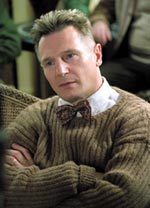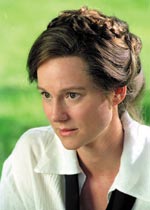Editor’s note: This R-rated film is very frank in its discussions about sexuality, and this review thus includes some sexual terminology that some readers might find offensive.
There are two ways to handle a highly controversial issue, especially when you are looking at the form it took several decades ago, before our culture had settled into its current attitudes and assumptions. For example, you could go the route of Vera Drake, Mike Leigh’s exquisitely detailed and complex study of abortions both legal and illegal in 1950s England; while Leigh himself has said that he is pro-choice, his film does not adopt any particular stance on the issue, and indeed, he even gives us room to wonder just how naive the title character is and how much harm she may be causing.

Or you could go the route of Kinsey, Bill Condon’s triumphalist depiction of the sexologist whose studies of human sexual behavior shocked and outraged post-war America. Rather than cause any similar disturbance to present-day audiences, the film mocks the sexual attitudes of the past from a safe distance while flattering us for our supposed sexual enlightenment, and it recounts in detail Alfred Kinsey’s battles against sexual prudery—is this really a pressing issue nowadays?—while minimizing some of his more unsettling “scientific” methods.
The film begins at the turn of the 20th century, as Kinsey’s Methodist father (John Lithgow) preaches a stern message against the perils of the modern age; phones, cars, and moving picture shows have all contributed to a decline in morals, he says. Kinsey himself is a boy scout who, together with his friends, is not quite sure what to make of the medically iffy advice their manuals have given them on the subject of masturbation and nocturnal emissions (will they really go blind or become insane?). By the time the adult Kinsey (Liam Neeson) meets and marries Clara McMillen (Laura Linney), he has become an expert on gall wasps, collecting tens of thousands of specimens in order to study their evolution from generation to generation. The Kinsey marriage gets off to a bad start, when the wedding night turns out to be more painful than they had anticipated, especially for Clara—but Kinsey quickly realizes that this, like all other problems, must have a scientific solution, and so they go looking for an expert who can solve it for them. Years of sexual bliss follow.
Then comes the fateful day that Kinsey turns his attention from insect behavior to the human kind. Convinced that his university students are not getting adequate information on sexuality, Kinsey institutes a “marriage” course that gives his students the facts of life, complete with X-rated photos which, apparently, can be shown in a film that has only an R rating. (It’s one of the film’s in-jokes that the uptight moralist who teaches the more old-fashioned class on sex, and who doesn’t seem to recognize the sexual euphemisms tossed his way by the students, is played by Tim Curry, who will forever be known as the “sweet transvestite from Transsexual Transylvania” in The Rocky Horror Picture Show.)

Emboldened by his success, Kinsey secures funding from the Rockefeller Foundation and begins to conduct a nationwide survey on sexual behavior; instead of letting people assume what “normal” sexual activity should be, he is determined to find out what people actually are doing, and to let the chips fall where they may. This requires Kinsey and his assistants to adopt a non-judgmental attitude when conducting interviews—all in the interests of science, of course—but, as Kinsey himself no doubt intends, it could also mean adopting a non-judgmental attitude with regard to moral standards outside the survey, as well. And so, on one of his research trips, Kinsey embarks on an affair with Clyde Martin (Peter Sarsgaard), an assistant of his who, before long, propositions Clara as well.
Kinsey the man and Kinsey the film have attracted no small amount of condemnation from critics, many of them faith-based, who accuse his studies of being little more than propaganda for sexual immorality, whether it be promiscuity, bestiality, even pedophilia; Kinsey’s studies are also the source for that popular but long since discredited statistic that ten percent of the population is homosexual. But the problem with Kinsey’s studies, at least as they are portrayed here, runs much deeper than mere morality; one thing that is completely missing from Kinsey’s life and work, or at least from this film’s depiction of them, is any sense of the fact that human sexuality has a fundamentally sacred component and cannot be reduced to the breeding instincts of wasps and rodents.
The film’s Kinsey is absolutely right about one thing: human beings are animals, and society as a whole and Christians in particular have often ignored this fact. But we are not only animals; as C.S. Lewis said, humans are “amphibious” creatures, both animal and spiritual, and sexuality is one of the places where our two natures intersect most strongly. On one level, sure, humans exchange genetic matter and bodily fluids just as all other creatures do, but on another, deeper level, sex between two humans makes them “one flesh”; as Lewis says in The Screwtape Letters, it creates a spiritual bond that must be either forever enjoyed or forever endured.

My parents have told me about the reticence of their own parents to talk about sex with their children—and the misinformation that flourished among their classmates. So it’s probably no exaggeration to say that families in Kinsey’s day could have benefited from a greater frankness about sexual matters—though not to the degree that Kinsey does, giving clinical tips to his daughters on how to enjoy intercourse with their boyfriends. But Kinsey is absolutely wrong to treat human sexuality as just another “animal activity,” and he is equally wrong when he implies that everything which happens in our world is “natural” and therefore good.
There are moments in the film that hint at the failings and limitations of Kinsey’s worldview, but they are typically contextualized or attenuated in a way that absolves the man of any serious blame. Kinsey and his wife reportedly had many lovers, but the film limits their affairs to a single, short-lived triangle with the relatively well-adjusted Clyde. Kinsey may have had a masochistic streak, but the film’s one instance of self-mutilation on his part makes it look like the result of stress caused by having to deal with the backlash from such a sexually repressed and censorious society. Kinsey’s studies also included some shocking assertions about the sexual behavior of very young children, all of them supposedly gleaned not from direct tests but from the memoirs of a single pansexual man, but the film’s Kinsey makes it clear, even as he dutifully takes notes, that he disapproves of forcing sexual behavior on anyone. (At best, one might wonder how scientifically valid a single stranger’s testimony on such matters might be, and at worst, Kinsey’s willingness to use this man’s information raises the same concerns we might raise with regard to other kinds of data that have come to us through criminal and immoral methods, such as the scientific tests performed at Nazi concentration camps—but the film never asks those questions.)

Kinsey constantly talks about “science” as though it were some sort of divine imperative, and the possibility that there may be some things that transcend or supersede science is all but ignored—at least until a point near the end of the film, where Kinsey remarks that love cannot be measured, so he didn’t bother to include it in his studies; the film would have us believe Kinsey did not have a big blind spot, but rather, he simply knew his limits. But Condon is so determined to portray Kinsey as a crusader for sexual liberation that he ends the film on an immeasurable, emotional note anyway, in which a lesbian (Lynn Redgrave, whose father Michael was famously bisexual) tearfully tells Kinsey that his book let her know that there were others like her out there, and therefore it saved her life.
Kinsey the man may have challenged the sexual and scientific orthodoxies of his day, but Kinsey the film is a hagiographic tribute to the man who helped make possible the emerging do-whatever-you-want orthodoxy of our own times. It wants to affirm the dignity of those who engage in taboo practices, but in order to do that, it has to accept the potentially dehumanizing premise on which his research was based. Condon may think Kinsey lifted certain people up, but in doing so, he brings humanity as a whole down a notch or two.
Talk About It
Discussion starters- Are human beings a form of “animal”? What about scriptural passages which might suggest an affinity between humans and animals—like when God created both humans and land animals on the same day?
- What kinds of lessons can we learn from nature, given that it is both (a) a creation of God’s and (b) fallen? (Consider Romans 1:20 and 8:19-2) How do we draw the line between what is and what should be? Is it ever okay to do something just because animals do it? (A positive example is found in Proverbs 6:6, the verse about considering the ant’s ways and being wise.)
- How openly do you think people should talk about sex? What about at the family dinner table? What about in mixed company? Do Christians talk enough about sex? Or too much? Explain.
The Family Corner
For parents to considerKinsey is rated R for pervasive sexual content, including some graphic images and descriptions. The film includes full male and female nudity and a wide range of presumably simulated sexual practices, including masturbation, adultery, homosexuality, and so on; characters also talk about having sex with animals and children. There is also a scene in which Kinsey’s wife discovers him in the bathroom after he has done something masochistic to himself and left a bit of blood on the floor.
Photos © Copyright Walt Disney Pictures
What Other Critics Are Saying
compiled by Jeffrey Overstreetfrom Film Forum, 11/18/04Hollywood has been known to offer us ethically misguided heroes in the past. James Bond, for example. But Kinsey may take us to a new low. To make matters worse, this individual’s outrageous exploits weren’t fiction, even though the movie that pays tribute is full of half-truths.
Director Bill Condon’s film celebrates a “scientist” whose research-gathering methods involved child molestation, shoddy experiments, and survey methods that break the rules of credible investigation. From these methods, he came to champion all manner of sexual misbehavior as acceptable animal behavior.
Liam Neeson is earning Oscar buzz for his performance as Kinsey, and Laura Linney’s winning raves for her role as his wife. Most mainstream critics, apparently unconcerned that the film is a whitewash of a fraud, are calling this one of the best films of the year.
But religious press critics are doing what they can to draw attention to the film’s tendency to cover up details that expose Kinsey for the deceiver and manipulator that he was.
R. Albert Mohler, Jr. (Crosswalk), president of The Southern Baptist Theological Seminary in Louisville, Kentucky, offers an extensive account of Kinsey’s work and influence in his assessment of the film. “The movie is really not a true portrait of Alfred Kinsey at all. The real Alfred Kinsey was a man whose own sexual practices cannot be safely described to the general public and whose interest in sex was anything but objective or scientific.”
Tom Neven (Plugged In) addresses ways in which Kinsey’s research was flawed, pointing out the poor and selective surveys he conducted. “People willing to talk to a total stranger about their sexual behavior … can hardly be considered a representative sample of the American public. Moreover, Kinsey used questionable statistical analyses to reach his conclusions.”
He also analyzes the problems with the movie, which he says are “too vast to itemize.” He calls it “propaganda” and says, “The film completely glosses over the immoral and damaging methods Kinsey and his associates used in the course of their research. [The book] Sexual Behavior in the Human Male … contains studies about the sexual response of infants, toddlers and other children. (Kinsey’s assistant Wardell Pomeroy has basically admitted that the studies involving children were derived from Kinsey’s own experiments.)” He also points out that Kinsey and his wife were “serial adulterers,” while the film only acknowledges single affairs. And he concludes that the worldview of the film is “insidious. It says ‘science’ (as defined by its practitioners) is the only way to know truth; all else is mere opinion and superstition.”
Morality in Media President Robert Peters (Christian Spotlight) says, “In Kinsey’s mind, man was merely an animal with a high degree of intelligence; and at the end of the film, in the midst of the credits, we are treated to scene after scene of animals having sex. In Kinsey’s mind, apparently no sex was abnormal; and among the types of sex that Kinsey is shown engaging in or endorsing in the film are adultery, bisexuality, homosexuality, group sex, pornography, sadomasochism, and swinging.”
He adds, “In the film Kinsey interviews a man who molested hundreds of children, but there is no other indication (unless I missed something) that Kinsey’s data about child sexuality came from pedophiles.”
David DiCerto (Catholic News Service) says, “Defenders will view the picture as a sober portrait of the man credited with emancipating sex from the shackles of Puritanism. Conversely, critics will question not only the movie’s accuracy, but the appropriateness of celebrating a man who many blame for jump-starting the sexual revolution by redefining societal mores and jettisoning inhibition and traditional morality to the relic heap of Victorian prudery.”
from Film Forum, 11/24/04Peter T. Chattaway (Christianity Today Movies) says, “The problem with Kinsey’s studies, at least as they are portrayed here, runs much deeper than mere morality; one thing that is completely missing from Kinsey’s life and work, or at least from this film’s depiction of them, is any sense of the fact that human sexuality has a fundamentally sacred component and cannot be reduced to the breeding instincts of wasps and rodents. Kinsey the man may have challenged the sexual and scientific orthodoxies of his day, but Kinsey the film is a hagiographic tribute to the man who helped make possible the emerging do-whatever-you-want orthodoxy of our own times. Condon may think Kinsey lifted certain people up, but in doing so, he brings humanity as a whole down a notch or two.”
from Film Forum, 12/09/04John Zmirak (Godspy) says Bill Condon’s film “leaves out the fact that after this single affair, both Dr. and Mrs. Kinsey became serial adulterers, using their image as a happily married couple as little more than a public relations ploy to help Kinsey’s conclusions gain broader acceptance. The film also omits Kinsey’s lifelong obsession with erotic self-torture. But the film does hint at Kinsey’s bizarre stunt of circumcising himself at home in the bathtub. Watching Kinsey was not just unsexy—it was anti-sexy. Attempting to strip the erotic of all its mystery, modesty, emotional content—even its shame—is self-defeating, in the end. Looking at men and women as merely animals renders human flesh finally meat, and replaces the tender touch of one lover’s hand upon another with the scalpel of a doctor doingthe autopsy on Cupid’s cadaver.”
from Film Forum, 01/27/05Steven D. Greydanus (Decent Films) says, “One of the film’s most important lines comes in the following rationale by Kinsey of his work: ‘One of the aims of science is to simplify. The only way to study sex with any scientific accuracy is to strip away everything but the physiological.’ As a methodological approach to what can and can’t be measured in human behavior, this might be a defensible assessment. But Kinsey and his colleagues didn’t just try to ‘strip away everything but the physiological’ analytically, but actually. They tried to live as if sex were nothing but physiological, and their published arguments assume the same point of view. How utterly wearying.”
Copyright © 2004 Christianity Today. Click for reprint information.












